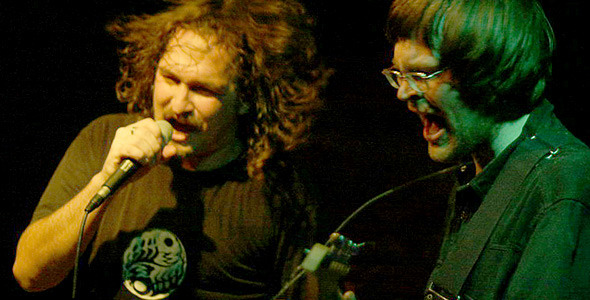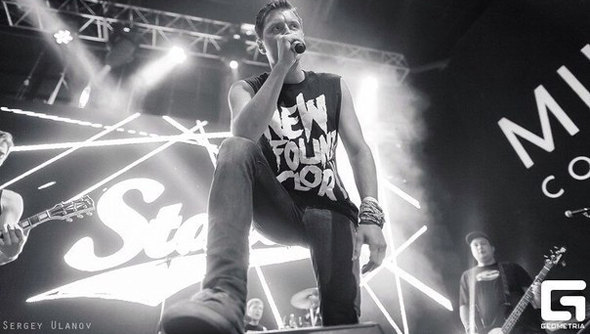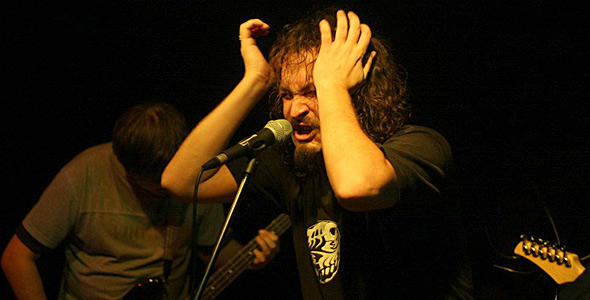Russia: Musicians Speak of Censorship, Persecution and Viciousness
by Free Muse and Oksana Chelysheva / May 14, 2014 / No comments
Violations of freedom of expression in Russia hit the front pages of newspapers and websites all over the world in 2012 when two members of the Russian punk group Pussy Riot were imprisoned. Many other music groups and artists in Russia face censorship and persecution – but their cases are never heard of outside of Russia. This in-depth report is written by the Russian journalist Oksana Chelysheva who is currently living and working in exile.
The Pussy Riot case with its two imprisoned members, Nadezhda Tolokonnikova and Maria Alyokhina, is still seen as “a connection between the world of music and human rights” as US Amnesty International described their case in one of their press releases. Scores of musicians, including Madonna, the Red Chilli Peppers, Peter Gabriel and Yoko Ono, have voiced their stance in support of the political prisoners.
The level of international support and recognition which Pussy Riot got gave birth to also fostered hopes that some attention would be drawn to Russian musicians who are subject to harassment and threats from the authorities. Actually, Pussy Riot were not the first to be targeted because of their performance. Unfortunately, neither are they going to be the last.
Violent Dispersals of Concerts
At the end of February 2014, I got a message from Nizhny Novgorod, the city I used to live in. The person [who sent the message] told me about an incident some of her friends had been trapped in the day before. One of [the city’s] small local clubs organized a concert in which three bands participated: Two of them, Slumdogs and Wild by Heart, were from Nizhny Novgorod and their guests were from another Russian city, Kaliningrad. The concert was about to end when riot police suddenly burst in. No warrants were presented. The Russian police argot has introduced a specific term for such violent dispersals of concerts: ‘prophylaxis,’ which is to be understood as a kind of ‘crime prevention.’
I asked my correspondent if her friends were going to file complaints with the prosecutor’s office as many of them were arbitrarily detained for longer than three hours and then just kicked out of police stations in the middle of the night.
She doubted it.
“If it was the first time or if it would make any difference, they would probably do it,” she explained.
Nizhny Novgorod
Nizhny Novgorod, located approximately 500 kilometers away from Moscow, is known for its art scene and steady protest movement. The alternative culture scene is quite diverse and vivid there. As such, the local branch of the Extremism Prevention Centre, an interdepartmental commission based in the Ministry of Interior, has gained an extremely negative reputation for their continuous involvement in organizing provocations against those whom they identify as linked to the opposition.
The Extremism Prevention Centre was not created out of nowhere. The centre was founded in September 2008 when the newly-elected president Dmitry Medvedev signed an order to introduce changes into the structure of the Interior Ministry. Instead of police departments to combat organised crime, a new group of “fighters against thought-crime” appeared. Their assignment, however, was not properly defined.
The first attempt to disperse the mist of the new law was undertaken only in 2011 as a reaction to tough criticism of the law. On 28 June 2011, Russia’s Supreme Court adopted the resolution entitled “Concerning Judicial Practice in Criminal Cases Regarding Crimes of Extremism.” It clarified a number of issues regarding the distinctions that determine different qualifications of alleged extremist acts. Among other issues, the court stated that any form of participation is sufficient to find a person guilty of the crime of extremism, even if no other crimes were committed.
Musicians playing alternative music, as well as organizers of their concerts, have been top priority for the Extremism Prevention Centre for quite some time. I have discussed the situation with three representatives of Russia’s alternative music circles. Ilgar Da and Roma Perinskiy are both from Nizhny Novogorod; Alexey Sochnev is from Moscow.
My fourth interlocutor is Viktor M., a musician and an organizer of antifa concerts in Saint Petersburg who is now seeking asylum in Europe.
Ilgar Da – Partybreaker
Ilgar Da is a musician with the hardcore group Partybreaker. He organizes concerts for other groups as well. Now sharing his time between his native Nizhny Novgorod and Moscow, Ilgar has got experience of both cities’ alternative music scenery. It is quite a common thing for people from Nizhny Novgorod. In Russian standards, the two cities are located quite close to each other, just some 500 km. The train communication is good: there are quite a few night trains and now the cities are connected with the high-speed train which minimized the travel time to three hours.
Ilgar’s opinion of the Extremism Prevention Centre is harsh:
“Although it is quite common [for] those young people who are involved into various subcultural movements to have a negative attitude towards law-enforcement agencies, due to their own level of consciousness of their own personality and their self-awareness of social responsibility. I’d genuinely not want to think that all policemen should be tarred with the same brush, but Anti-Extremism Centres are the worst example of police arbitrariness.”
Still many of the policemen who the Anti-Extremism Centres are staffed with have not forgotten the methods and techniques they had used while dealing with mafia-type gangsters. They are applying the same methods to deal with young people who have committed nothing but have courage to have their own opinions.
Ilgar tells about the concert in a small club at which my daughter’s friends got their “baptism of fire”:
“That evening the riot police burst in to the club under the pretext of searching for drugs. They didn’t find anything. However, in many other cases the police don’t even bother to feign any pretext. They just burst in, fingerprint all present at a concert by force and never hesitate to beat people up. I really don’t have a clue what the real purpose of such actions are. There have been cases when Anti-Extremism Centre comes to a concert searching for someone who has already drawn their attention and then they try to force them to become their informants.”
Roma Perinskiy – Starov
Roma Perinskiy, also an organizer of concerts and a musician with the rock band Starov, tells:
“The most favorite method of the Anti-Extremism Centre is the following one. They learn that somewhere a semi-closed concert is to be held. They immediately inform the police detachment on drug control that a gathering of young people is planned where some of them can be drug-users. Then it is their turn to go into action. Drug police raid the place, detain everybody and establish signs of marijuana in tests of one or two people. It was when the anti-extremists take over interrogating people and intimidating them, forcing to sign agreements to cooperate. Why are they doing it? I suppose they just fail to combat real extremists who are quite a challenge for them. I mean those who kill people, who explode buses and railway stations like [what] happened in Volgograd last year. I have not heard of any single big case which could be a victory of the Extremism-Prevention Centre. But I know a lot about the cases fabricated by them. In Nizhny Novgorod, for instance, they planted fake membership cards among belongings of several people from our circles. Those IDs attributed them to never-existing organization Antifa-R.A.S.H. A lot of good people including musicians with Vo Ves Golos (Let One’s Voice Be Heard) and Wild By Heart got implicated into this case.”
Ilgar adds, “It is very important to understand that in our punk world a listener is hardly different from a musician. During concerts someone from the audience often jumps onto the stage, grabs a mike and starts singing. There is no barrier between musicians and the audience. They are all at the same level. If someone from the community is in trouble, we are trying to help. We do support Alexey Gaskarov, also by holding new concerts. Or like the case with a young woman, Darya Pisarenko, who has lost some of her face bones as a result of cancer surgery we also organize concerts to raise money for her reconstructive surgery. Darya is not a musician but she is part of our stage world.”
Alexey Sochnev – The Red Cross
Alexey Sochnev, a journalist and singer with the punk band The Red Cross confirms this. Their group has been on the ban list in Voronezh for several years after they participated in a concert in solidarity with Russia’s political prisoners.
“It happened in December 2009,” recalls Alexey: “The concert was underground because of its political message. There were several bands playing punk, both local and from other cities, including Moscow and Lipetsk. The atmosphere was different from Moscow where any speeches between songs had already been banned by that time. I was also reciting my verses, satirical of the United Russia party. The concert was not disrupted. The audience responded to the music by signing together or shouting slogans, ‘Repel 282’ (Article 282 of the Russian Criminal Code is the one which makes ‘extremist calls’ liable for criminal prosecution). But later that evening police smashed the door of the flat where we were supposed to stay overnight and beat up all people there. We were then told that they had been looking for us. Since then no club in Voronezh has agreed to host our concerts. Besides, the owner of that club was later pressured to sign a paper that he would cooperate with the police informing on visitors. He warned about it, closed the club down and keeps drinking, as far as I know.”
Alexey thinks that police doesn’t see much difference between a street rally and a club stage. “They regard concerts to be even more dangerous as there is no authorization required to organize them,” he explains.
Ilgar Da adds to the picture described by Alexey Sochnev: “Moscow is more dynamic than Nizhny Novgorod or other provincial cities. Here the same methods are applied but reprisals are reality not just for anyone from the musical circles but for those who have already become media persons. Like what happened to Alexey Gaskarov, a social activist arrested in Moscow in April 2013. He didn’t play any music but he had a role in organizing concerts and often participated in them as a spokesperson for the anti-fascist and environmentalist movements. He is part of our music community. Russia’s music ‘stage’ is a live organism without leaders or structures.”
Viktor M. – Concert Organizer
As for the level of problems concert organizers are experiencing, Viktor M. lived in Saint Petersburg. It happened before the elections to the Russian State Duma in November 2011. People with the local detachment of the Anti-Extremism Centre approached him and warned not to hold any concerts before the elections. He didn’t promise and he did organize one. It was enough to be targeted. Police stopped him on the way back home one evening, dragged him into their [car] and planted a small package of some drugs into his pocket.
Viktor M. tells: “The organizers are the first to be harassed as a club manager immediately would fingerpoint at an organizer if he senses any trouble in the air. They are seen as a root of a problem: if there is no one to organize a concert, there is no concert and, consequently, the police have less headache. Targeting organizers of concerts is one of the favorite methods of work for the police as they generate the illusion that they control the situation with some particular social movement regardless whether these are antifa, anarchists, or neo-nazi, if they manage to threaten them. The same refers to performances at some rallies. Any attempt by a musician to appear and speak up at a rally is doomed with punishment. All clubs will necessarily receive special recommendations not to let this very musician perform in a club.”
“What can international community of musicians do to help such punk musicians like you?” was one of the last questions to all these young people.
Ilgar Da: “The problems we are facing in Russia are not just connected with self-expression. Our musical community is a counter-movement to viciousness of the society in general, its social inequality, drunkenness, inhuman treatment of animals, indifference to other people’s suffering. It is why the state regards us as their enemies. One of our friends who was targeted with Antifa-RASH case initially drew negative attention of the Anti-Extremism Centre because he had mounted a slogan with permission on 1 May. After that, surveillance on him was [so] tough that the police were even filming free distribution of vegetarian food among the homeless which was cooked by members of the “Food not War” movement. What can really help is establishing direct contacts. People here have to get more information on what they can do if their situation becomes critical. Now it looks as if the only way to draw attention is to dance in Christ the Savior cathedral. People who have been targeted with the absurd Antifa-RASH case also need help.”
Some of those who have come under reprisals due to that “fake IDs” criminal case had to flee Russia. However, they are still in trouble as their cases are stuck, due to the situation in Ukraine.
Alexey Sochnev has a very similar opinion:
“I am certain that the most efficient way to help us is to organize as many joint festivals as possible. They might operate as a venue to spread information on individual cases and launch campaigns in support of musicians. As police units of different countries do pay visits to one another, why not musicians start holding similar gatherings. At that, they would require two different formats. For instance, they can be a way for political lobbying if they are organized in the same cities and at the same time where police hold their summits. And an absolutely different format would be used to hold festivals with the purpose to strengthen friendship among peoples. Such festivals should be organized in areas bordering with Russia in Finland, the Baltic states, or Ukraine.”
Stanislaw Dmitrievskiy – Human Rights Defender
Stanislaw Dmitrievskiy, an outspoken human rights defender from Nizhny Novgorod, comments on the reasons why the city Anti-Extremist Centre is paying so much attention to musicians:
“First and foremost, Anti-Extremist Centres is a new type of political police. Secondly, the local branch is characterized with their special zest to organize provocations against activists here. They are not just performing their duties or following the orders. Their chief, the police colonel Alexey Trifonov, is notoriously known for the absolutely insane joy he experiences from the attacks he is behind. He has been very active in Twitter, openly commenting on the attacks, and he doesn’t even try to hide his role in organizing the attacks.”
Albert Kuznetsov – Lawyer
The same opinion is shared by Albert Kuznetsov, a lawyer with Investigatory Group of Nizhny Novgorod-based Committee against Torture:
“Since 2010 there have been 12 cases of various violations committed by the Anti-Extremism Centre which we tried to investigate. Almost all investigations got stuck at the level of courts. It looks as if the Anti-Extremist Centres have been given a green light to act. As such, their reputation even among colleagues serving in other departments is very low. Their colleagues privately tell us that these political police invent crimes and take huge resources away from fighting real criminality.”
Albert Kuznetsov also supports Stanislaw Dmitrievskiy in his estimation of the role Alexey Trifonov, the chief of the Anti-Extremism Centre, has:
“We know that Trifonov really feels flattered when his detachment is compared with Nazi Gestapo. He even boasts that the level of his bonus depends on the amount of complaints filed against them: the more complaints there are, the more awards he will get.”
This article was originally published by Free Muse on April 30, 2014.







